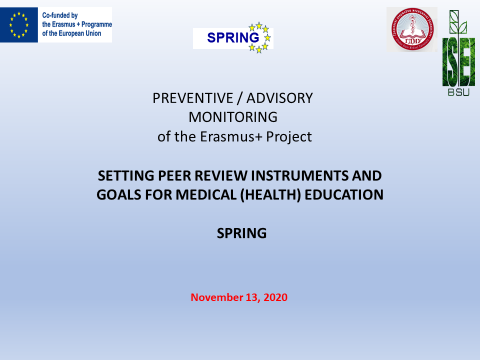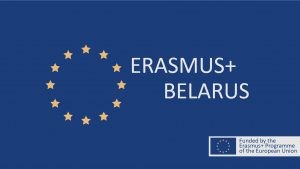The monitoring of the SPRING project (Setting peer review instruments and goals for medical (health) education

 On November 13, 2020, the monitoring of the SPRING project (Setting peer review instruments and goals for medical (health) education took place
On November 13, 2020, the monitoring of the SPRING project (Setting peer review instruments and goals for medical (health) education took place
The online meeting was attended by:
- Oksana Minich, Head of the National Erasmus + office in Belarus;
- Ekaterina Minyukovich, Erasmus + office administrator;
- Irina Labkova, ERASMUS + office administrator,
- Sergey Maskevich, Director of International Sakharov Environmental Institute of Belarusian State University (ISEI, BSU),
- Levan Metreveli, Project Coordinator, BAU Batumi International University
- Alexey Sysa, Dean of the Faculty of Environmental Medicine / Project Coordinator, International Sakharov Environmental Institute of Belarusian State University (ISEI, BSU),
- Elena Alekseychik, Head of International Relations / Project Manager, International Sakharov Environmental Institute of Belarusian State University (ISEI, BSU),
- Igor Buchenkov, Deputy Director for Academic and Educational Work / Expert Lecturer,
- Natalya Chemeneva, Deputy Chief Accountant / Financial Project Manager, International Sakharov Environmental Institute of Belarusian State University
- Ekaterina Loban, specialist of the International Relations Department / translator of the project, International Sakharov Environmental Institute of Belarusian State University (ISEI, BSU),
- Marina Surmach, Head of the Department of Public Health and Health Care Service / Project Coordinator, Grodno State Medical University,
- Yanina Razvodovskaya, Head of the Department of Foreign Languages / Expert Teacher, Grodno State Medical University,
- Oksana Mozalevich, Head of International Relations Department / Project Manager, Grodno State Medical University.
 The audit by the National Erasmus Office in the Republic of Belarus covered the following aspects of the project implementation:
The audit by the National Erasmus Office in the Republic of Belarus covered the following aspects of the project implementation:
-
internal and external measures to ensure project quality,
-
preparatory measures for its implementation,
-
actual expected results and goals of the project: their feasibility and degree of achievement at the time of monitoring,
-
percentage of work completed (compared to the work program),
-
the amount of the budget used and the procedure for its use, to what extent all partner universities complied with the project work program and the requirements of grant agreements.
Special attention is paid to the dissemination strategy adopted by the project, including its impact on students and staff, as well as the possible application of the results by other beneficiary universities in the Republic of Belarus.
Long-term results of the project were recognized as promising in terms of demand >These are the publication of the annual scientific and practical journal "Peer Review in medical (health) education for Eastern Europe and Central Asia (ECOMED-EECA)" and the creation of an independent multinational Peer Review Association for medical (health) education of Eastern Europe and Central Asia aimed at providing a group of highly qualified and free experts and at assisting medical education institutions in target regions with effective training and international accreditation.
The coordinator of the project consortium Levan Metreveli emphasized that in order to further ensure the sustainable implementation and quality of project results, special attention will be paid to the selection of online training participants, members of groups for peer review of quality, and the formation of multinational teams. It was noted that the implementation of the project is proceeding successfully, in full, the adaptation of the project work program is carried out only in connection with the unfavorable epidemiological situation caused by the COVID-19 pandemic.
According to the preliminary results of monitoring, no violations were revealed, no remarks. The Erasmus National Office proposed several aspects for improvement and noted the high quality of training by partner universities from Belarus (ISEI and GrSMU) reporting materials.
The results of monitoring can be found on the page of the national office of Erasmus in Belarus.

 Grodno State
Grodno State